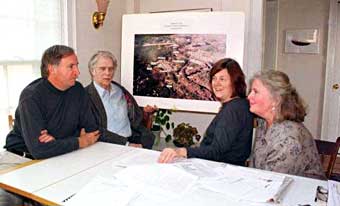 In front of an aerial photo of Starmet Corporation,
Judy Scotnicki (third from left), Mary Jane
Williams, and other CREW members discuss
ways of removing radioactive contamination.
(Concord, Massachusetts) In front of an aerial photo of Starmet Corporation,
Judy Scotnicki (third from left), Mary Jane
Williams, and other CREW members discuss
ways of removing radioactive contamination.
(Concord, Massachusetts) |
| Grassroots push for a manufacture Ban Unflagging safety efforts |
"We did what we could." "Yes, but the clean-up is just beginning."
Reviewing their 11 years of grassroots activities were writer Mary Jane Williams (56) and former high school teacher Judy Scotnicki (57).
![]() Accusations of radiation contamination
Accusations of radiation contamination
Members of Citizens Research and Environmental Watch (CREW) were gathered in Judy's home in Concord, Massachusetts. Since 1989, the two women have spearheaded the fight to keep Starmet Corporation (formerly, Nuclear Metals Inc.) from contaminating the environment with radioactivity from the manufacture of DU penetrators.
"And for this we were labeled extremists by Starmet and by all the members of town governing boards who are cozy with the company. All we've done is ask them to guard the safety of the people." Mary Jane, CREW's first president, flushed as she spoke.
The first things CREW worked on were (1) measures to protect against the DU materials processed by Starmet; (2) a residents' evacuation plan for disasters; (3) setting a deadline for the removal of the radioactive materials left on the premises; and (4) securing funding for this removal. After obtaining nearly 1,000 signatures, they presented a petition to Concord's Board of Health in 1990.
"The reactions were harsh. The company has contributed to the area by paying taxes, making donations to schools and hospitals, and in other ways. So the Board ignored us," said Judy.
![]() Analyzing 1,200 pages of materials
Analyzing 1,200 pages of materials
Dr. Marvin Resnikoff, a nuclear physicist employed by CREW in 1991, analyzed 1,200 pages of relevant materials possessed by the Nuclear Regulatory Commission and the state Department of Environmental Protection. His report was publicized in the local daily newspaper, The Minuteman Chronicle, on March 31, less than a month after the cease-fire agreement that ended the Persian Gulf War.
"During the Gulf War, allied forces used armor-piercing projectiles produced by Nuclear Metals, Inc. to help destroy Iraqi tanks. Closer to home, however, Concord residents have been voicing concerns that the uranium used in the production of armaments and other Nuclear Metals products may threaten their future health."
Dr. Resnikoff's analysis of the materials revealed that the groundwater and soil on the property of the factory were contaminated by DU, and that minute uranium particles had drifted off the site. At one time, only two of the company's almost 50 smokestacks were fitted with filters. It was also revealed that highly flammable DU frequently sparked small fires during the manufacturing process.
Appeals at gatherings and town meetings; letters to the editor; petition campaigns; negotiations with the Concord Board of Health, the Department of Environmental Protection, and the company; commissioning specialists to study soil contamination-CREW members worked untiringly.
![]() Seeking complete decontamination
Seeking complete decontamination
"These 11 years, we've been doing everything we could think of to teach ourselves about the dangers of DU contamination and share it with the people of the community. People have gradually come to understand. But it's still urgent that they clean-up the contaminated soil and groundwater under Starmet's land," said Judy.
The members of CREW want Superfund designation by the federal Environmental Protection Agency (EPA) for the site to ensure the availability of funds and expertise for clean-up. Town governing boards finally reached consensus that seeking status as a Superfund site was a good idea in early 2000. The company, Starmet, continues to argue against Superfund status.
In September 2000, the governor of Massachusetts formally requested the EPA to designate the Starmet site as a federal Superfund site.
The efforts of Judy Scotnicki and the others go beyond applying pressure to the company and local governing boards to completely clean-up the site. CREW also networks with groups around the USA who are dealing with radiation contamination from DU and other sources, and with Gulf War veterans suffering from disorders.
"How much have DU rounds harmed people and the environment? When we think about that, we feel that we residents of Concord should assume responsibility for getting a production ban on DU penetrators."
The CREW members nodding agreement with Judy's remarks seemed determined to carry their fight to a wider arena.